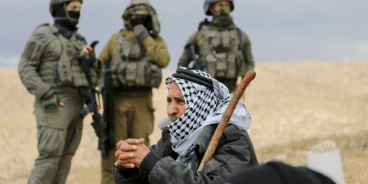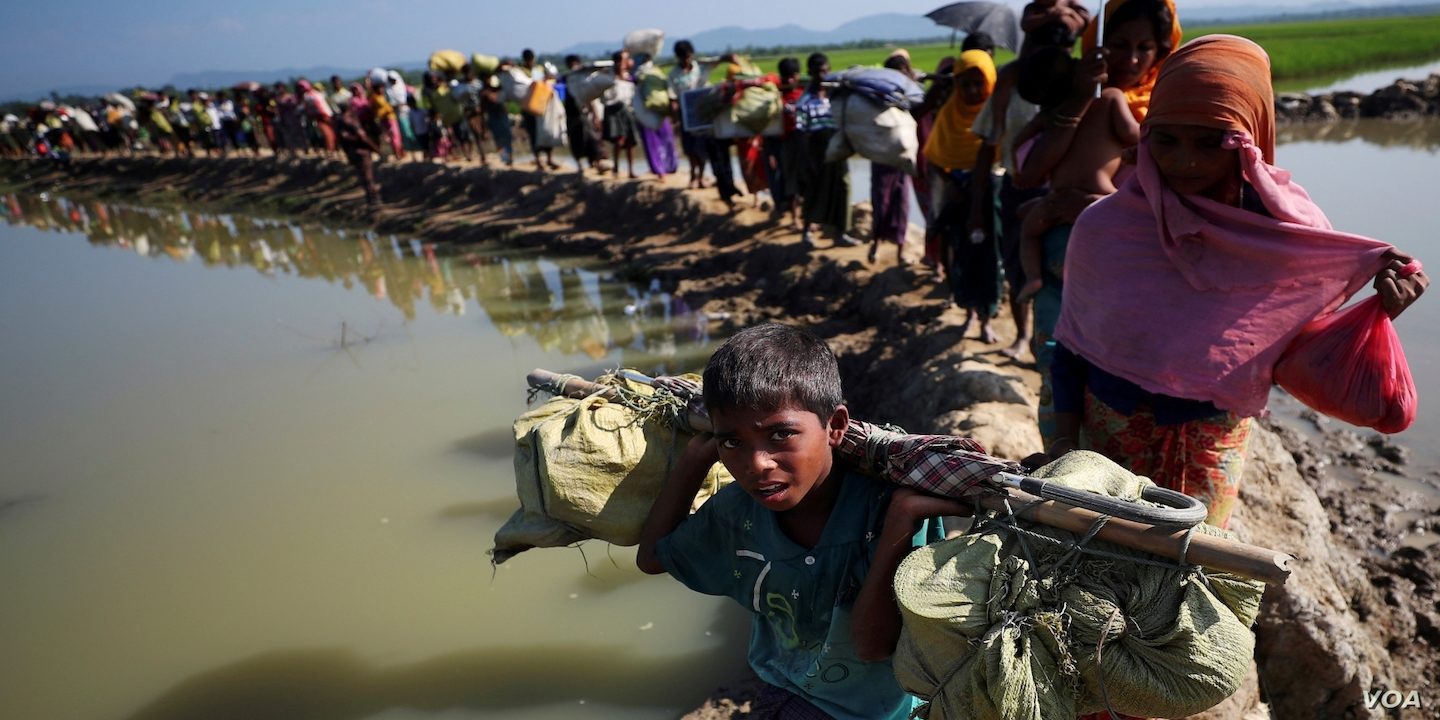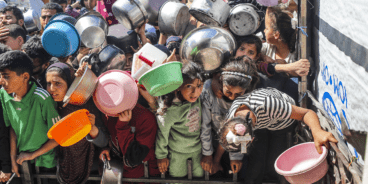

Atrocity Alert No. 166: Myanmar (Burma), Children and Armed Conflict and Democratic Republic of the Congo
Atrocity Alert is a weekly publication by the Global Centre for the Responsibility to Protect highlighting situations where populations are at risk of, or are enduring, mass atrocity crimes.
>
New UN report exposes financial ties of Myanmar’s military
On Monday, 5 August, the UN Human Rights Council-mandated Independent International Fact-Finding Mission on Myanmar (FFM) released a report on the vast business empire controlled by Myanmar’s military (Tatmadaw).
The FFM has previously concluded that the military committed crimes against humanity and war crimes in Rakhine, Shan and Kachin states, as well as acts of genocide against the Rohingya minority in Rakhine State. The new report found that the revenues generated by the military provide financial support for its operations “with their wide array of international human rights and humanitarian law violations.” Sexual violence and forced labor have also been perpetrated by the military in connection with its business activities in the mining sector, particularly in Kachin and Shan states.
Senior military figures reportedly solicited more than USD $10 million in donations from at least 45 companies and organizations in support of its genocidal campaign against the Rohingya in Rakhine State during 2017. Some private companies with links to the military are now financing development projects in northern Rakhine State “in furtherance of the Tatmadaw’s objective of re-engineering the region in a way that erases evidence of Rohingya belonging in Myanmar, and preventing their return to access their homeland.” The report also found that 14 foreign companies from seven countries (China, Democratic People’s Republic of Korea, India, Israel, Philippines, Russia and Ukraine) have provided arms to Myanmar’s military since 2016, despite the Tatmadaw’s appalling human rights record.
The FFM called upon the UN Security Council, regional organizations and all UN member states to impose a comprehensive arms embargo on Myanmar and targeted sanctions against companies owned by the Tatmadaw. The FFM also advised businesses and investors to “not enter into or remain in a business relationship of any kind with the security forces of Myanmar.” All investment in conflict-affected areas should be conducted in strict adherence with the UN’s Guiding Principles for Business and Human Rights.
Nearly two years have passed since Myanmar’s security forces initiated so-called “clearance operations” in Rakhine State, resulting in tens of thousands of deaths and the exodus of more than 700,000 Rohingya refugees to Bangladesh. Armed conflict and potential mass atrocity crimes continue in Rakhine, Kachin and Shan states. The UN Security Council should immediately refer the situation in Myanmar to the International Criminal Court and Myanmar should also be taken to the International Court of Justice for breaching its obligations under the Genocide Convention.
24,000 ‘grave violations’ made 2018 the worst year on record for children and armed conflict
Last week the UN Secretary-General released his annual report on children and armed conflict, noting that 2018 was the worst year since the UN began monitoring violations in 2005. Across 20 conflict situations more than 24,000 “grave violations” were perpetrated against children, including at least 12,000 children who were killed or maimed. The report also documents 933 reported cases of sexual violence against children and 7,000 cases of children being recruited as child soldiers. On Friday, 2 August, the UN Security Council held an open debate on children and armed conflict, during which member states discussed the report.
The majority of the violations listed in the Secretary-General’s report were perpetrated in countries where mass atrocities are ongoing or have recently been perpetrated, including Afghanistan, Cameroon, Central African Republic, Democratic Republic of the Congo, Iraq, Israel and the Occupied Palestinian Territories, Libya, Myanmar (Burma), Nigeria, Philippines, Somalia, South Sudan, Sudan, Syria and Yemen.
Notably, at least 927 children were killed in Afghanistan, the highest number ever recorded in the country and the highest in the world for 2018. Despite claims by the Syrian government and its allies that the civil war is largely over, the Secretary-General also recorded 3,021 grave violations in Syria during 2018, the highest number ever recorded in that country.
Children were also affected by attacks on schools and hospitals, with millions of children around the world deprived of access to an education. The Secretary-General highlighted that 827 schools were closed in Mali as a result of violence. Meanwhile in neighboring Nigeria the armed extremist group Boko Haram continues to target girls’ education.
This month the UN will mark 20 years since the first Security Council resolution on children and armed conflict and 10 years since the Council mandated that “killing and maiming, rape and other forms of sexual violence against children” result in the responsible parties being listed in the annexes of the annual report of the UN Secretary-General. In 2016 it was widely reported that Saudi Arabia had threatened the UN with financial reprisals if their name was not kept off the list, despite evidence of possible war crimes committed against children in Yemen. This year’s report lists the “Coalition to Support Legitimacy in Yemen” as a party that has taken measures to improve the protection of civilians in conflict.
While commemorating these important resolutions, UN member states must do more to uphold their responsibility to protect children. As recommended by the UN Secretary-General, all UN member states should implement the Optional Protocol to the Convention on the Rights of the Children, the Paris Principles, the Vancouver Principles, and abide by the Safe Schools Declaration.
An epidemic of Ebola and extrajudicial killings in the DRC
Last Friday, 2 August, the UN Security Council adopted a Presidential Statement on the ongoing Ebola outbreak in the Democratic Republic of the Congo (DRC) which has claimed the lives of over 1,800 people since 1 August 2018 and has been declared a “Public Health Emergency of International Concern” by the World Health Organization (WHO).
The statement also addressed how insecurity in eastern DRC has hampered efforts to curtail the outbreak. Armed groups such as the so-called Allied Democratic Forces, who operate near Beni, have deliberately obstructed efforts to control the epidemic. The WHO has documented more than 198 attacks on health facilities and personnel in eastern DRC since August 2018. The Council condemned “all attacks” against medical personnel “as well as attacks on their means of transport and equipment, hospitals and other medical facilities.” According to local civil society organizations, at least seven civilians have been killed around Beni since the UN Security Council met on Friday.
Attacks on Ebola treatment facilities are just part of the ongoing security crisis in the DRC. The UN Joint Human Rights Office in the DRC (UNJHRO) documented 3,039 human rights violations during the first six months of 2019, more than half of which were perpetrated by state agents. Most of the documented violations were perpetrated in conflict-affected provinces, with 45 percent occurring in North Kivu and Ituri where the majority of Ebola cases have been reported. In conflict-affected provinces more than 173 people were extrajudicially executed by government security forces while 416 were killed by non-state armed groups. UNJHRO also documented 407 cases of conflict related sexual violence, 77 percent of which were perpetrated by armed groups.
The DRC government, together with the UN peacekeeping mission (MONUSCO), must provide enhanced protection to humanitarian workers and medical personnel in Ebola-affected regions. All perpetrators of attacks against medical facilities and personnel should be held legally accountable, in keeping with UN Security Council Resolution 2286. The DRC government also needs to ensure that security forces consistently uphold international humanitarian and human rights law, and punish all perpetrators of extrajudicial killings and sexual violence, regardless of rank or affiliation.
Related Publications


Gaza: Starvation or Gunfire - This is Not a Humanitarian Response
